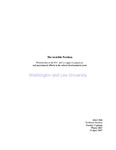The Invisible Problem: Malnutrition in the U.S. and its Cognitive, Physical, and Psychosocial Effects in the Critical Developmental Years

View/
Author
Shih, Alice
Subject
Washington and Lee University, Shepherd Poverty Program
Capabilities approach (Social sciences)
Social justice
Poverty
Malnutrition in children -- Complications
Food Stamp Program (U.S.)
National School Lunch Program (U.S.)
Special Supplemental Nutrition Program for Women, Infants, and Children (U.S.)
Metadata
Show full item recordDescription
Alice Shih is a member of the Class of 2008 of Washington and Lee University. Capstone; [FULL-TEXT FREELY AVAILABLE ONLINE] Malnutrition in the United States has been denied and overshadowed by international malnutrition. However, it is time for our nation to face the effects of malnutrition within our borders before we forsake and condemn another generation. Especially devastating are the 13 million children who live in food insecure environments. Each passing day is a day lost of cognitive, physical, and psychosocial development. However, these irreversible effects are preventable. By changing the current environment of malnourished children, we are fulfilling the basic human right to flourish. The U.S. has the resources of food availability to provide proper nutrition for each of its citizens with no added burden to the rest of society. To neglect this duty by ignoring food access and adequate food use is to deny social justice. Eradicating malnutrition in the U.S. is within our capabilities and the policies I have presented are the first steps toward attaining the goal. . . . [From Conclusion] Alice Shih